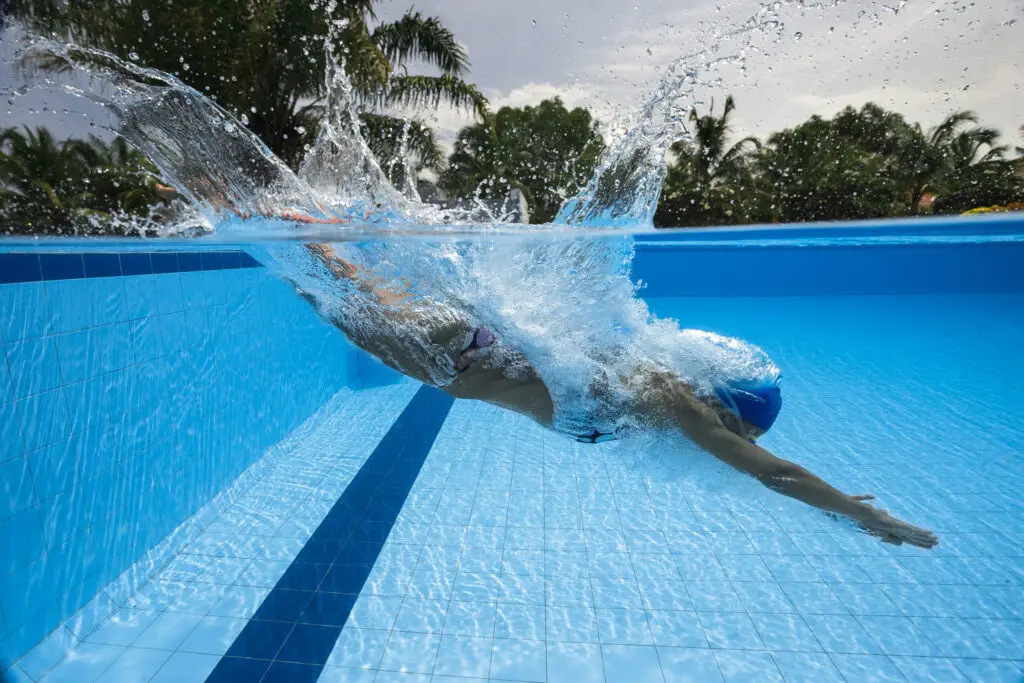In the warm weather months, more than just fish are jumping. People are diving and swimming in the ocean, lakes, and pools and, when proper safety practices are not used, accidents can happen. Injuries to the neck and back occur with great regularity every summer and the spine specialists at Texas Back Institute are all too familiar with the serious back injuries that occur as a result of water sports.
As the father of very active boys and a board-certified orthopedic surgeon at Texas Back Institute, Dr. Rey Bosita has first-hand knowledge of how having fun in the sun with water sports can also be dangerous. He offered some insights on how one’s neck and back can be spared injury from swimming and diving.
This Spine Surgeon Has Personal Experience with Swimming and Diving Accidents
 “My kids and I love to go to the pool or the beach,” Dr. Bosita said. “Anything to get out of the hot Texas sun. We play games such as basketball, volleyball, ‘Marco Polo’ and we have swimming races.
“My kids and I love to go to the pool or the beach,” Dr. Bosita said. “Anything to get out of the hot Texas sun. We play games such as basketball, volleyball, ‘Marco Polo’ and we have swimming races.
“I am very interested in ‘spreading the word’ about water safety because I almost drowned from a water injury. One time, my mom had to dive into the pool to rescue me while she was dressed to go to a dinner party! I am very lucky to be alive after this accident and I want to encourage safe water sports practices among all ages.”
Walk, Don’t Run!
Swimming is an excellent form of exercise because it is a low-impact fitness activity. However, the pool can be a dangerous place. Standing water on surfaces can cause slips and potential injury. Plus, diving into the water, especially when the depth is unknown, can injure the neck and back.
“The problem with being at the pool with friends is all the excitement,” Dr. Bosita said. “We want to get from one place to another, quickly. There is a very good reason for lifeguards blowing their whistle and reminding us to ‘walk’ around the surface of a pool. The concrete or marble that is around the pool can become very slippery when it is covered with water.
“I have treated many patients in my practice who have injured themselves from slipping and falling. Some had broken arms or legs, sprained wrists or suffered more serious injuries simply because they were running, rather than walking, around the pool. When a person is carrying towels or a bag with all of the various swimming equipment (goggles, ear-plugs, sunblock, refreshments and so forth) and they are walking too fast, they can slip and injure their back.
“Typically, they will fall backward, landing on their buttocks or back and they will feel pain from this fall. This pain can be felt in the back, shooting down the legs, or the neck and head. If this pain persists, it is advisable for the person to see a spine specialist to ensure that some form of nerve pinching or fracture has not occurred from this fall.
“The best way to avoid injuries from slipping on the surface of the pool is to remember that just because it doesn’t look wet, it probably is and you should always walk, not run around the pool.”
Avoiding Diving Accidents
Much more serious injuries to the neck and spine can occur as a result of diving accidents.
“These are some of the saddest cases I see as a spine surgeon,” Dr. Bosita said. “In some cases, a group of friends can be playing around the pool and one person will decide to dive into where the water is too shallow. This can result in hitting their head on the bottom of the pool at a high velocity.
“In some cases, this can result in a broken neck or another injury that requires surgery. Luckily, in most cases, the injury is a mild concussion or pain.”
Divers can avoid serious neck or back injury by following a very simple rule.
“While it might seem obvious, the first thing a diver should check is the depth of the water where he or she is considering diving,” he said. “The best way to check this is to carefully jump into the water, feet first, and determine just how deep the water really is. Sometimes the depth of the pool is unlabeled or even labeled incorrectly. In an unfamiliar pool or natural water source such as a lake or swimming hole, it is very important for the diver to know how deep the water is and if it is safe to dive at that spot.
“As for competitive divers, my hat is off to those who start their dive 10 or 20 meters above the water! Competitive divers are well trained and use techniques that are safe. The problem occurs when untrained divers, such as you and me, see these dives off a high platform or even a cliff, and we want to do the same dive. Unfortunately, untrained divers can over-rotate or under-rotate and hit the surface of the water hard enough to sustain injuries.”
When to See a Spine Specialist
While most water-related injuries are minor, some require attention from a neck or back doctor. Dr. Bosita points to the “red flags” to watch out for.
“If the person becomes unconscious, is unaware of his or her surroundings or begins vomiting, they should be taken to the emergency room immediately,” he said. “If the person has any loss in bodily function or weakness and/or loss of feeling in the arms or legs, this is a potentially dangerous situation and they should be examined immediately.
“Pain is also a sign that immediate medical attention is required. If something hurts bad enough this could be a sign of a muscle or bone injury. It’s always better to be safe than sorry.”





Dr. Rey Bosita emphasizes spine safety during summer water activities. Key tips include walking—not running—around pools, checking water depth before diving, and seeking medical attention if pain persists.